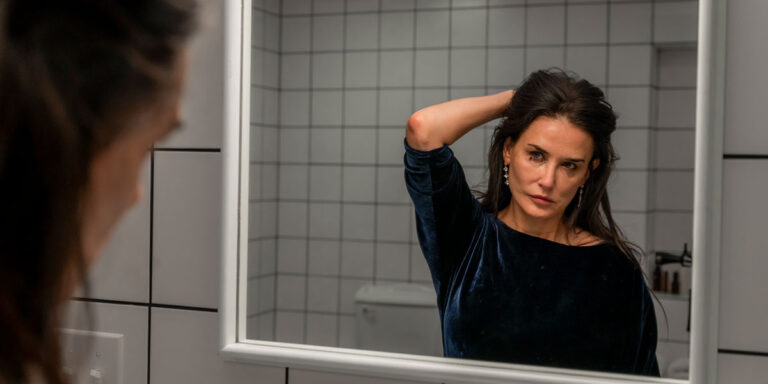The Substance (2024 | UK/USA/France | 140 minutes | Coralie Fargeat)
In Coralie Fargeat’s arch satire of intense body horror, Demi Moore bares all as Elizabeth Sparkle, a gracefully aging Hollywood celebrity whose Oscar-winning career has dead-ended at a network exercise show. As the film opens, we see that her star has literally faded (this film is the definition of nuanced but not subtle) and she’s off to a terrible 50th birthday. Her her chauvinistic producer, “Harvey” (a sweaty and repulsive Dennis Quaid shot in wide-angle close-ups; again, this film is not pulling any punches) can’t wait to be rid of her in favor of someone more nubile to host his weirdly popular fitness program.
While being examined after a traumatic car accident, an incredibly handsome nurse slips her a card for a mysterious yet life changing subscription service. With stark minimal branding akin to today’s rapidly proliferating wellness apps and a neutral voice at the other end of the line, she’s introduced to THE SUBSTANCE. With nothing but a code number and the fortitude to pick up her monthly supply in an ominous alleyway Amazon-style locker, she gains the ability to live her life as a more perfect version of herself.
Her aged body is the matrix from which the fresh version emerges, but there’s a very important catch: she has to switch back to her old body exactly every seven days. Sounds like a terrible deal, especially to those of us who think that Demi Moore’s current sixty-two-year-old form looks pretty incredible (she’s playing a fifty-year-old here). But for Elizabeth, alone in her luxury apartment with its great view and little else in the way of career or romantic prospects, the chance at a reboot is a jailbreak from the prison of her own body and a getaway from society’s crushing expectations. It’s just too appealing to deny.
And so, with an easy-to-use kit, she shoots herself up with a syringe full of neon green activator fluid and Fargeat’s film gets exceptionally gnarly. From the moment a glistening Margaret Qualley emerges from Moore’s split open spine like Luke Skywalker from the tauntaun or Rebel Wilson from the catsuit in Cats, the audience is implicated in seeing exactly why Elizabeth Sparkle would want to toss aside her old lifeless body like yesterday’s news in favor of living in this youthful perfect body. Demi’s body is left unceremoniously on the stark white bathroom tile, the husk subsisting off of milky pre-packaged goop through an IV line, with her own fluids providing daily stability for “Deb”.
Deb’s a bit of an echo of Qualley’s role in Poor Things, but here her mad science experiment has a professional at the helm. Her first errand isn’t for the pleasures of her perfect new flesh, but for the satisfaction of landing a role on the power of poise and sex appeal. It’s this power — launching a new fitness show for her shitty old boss in her perfect new body — that gives her the greatest satisfaction. The addictive thrill of this rebirth and all its possibilities quickly sets off a divergence of personalities and a war for possession of agency. The more time spent as Deb, the worse things get for Elizabeth. Qualley’s in the secondary role, but the part gives her plenty to do in charting a course where we believe her first as an extension of Moore’s Elizabeth and then as something else as their interests diverge. Even as resentment grows and the physical consequences of rule-breaking get increasingly grotesque, the appeal of being Deb is so intoxicating that the “primary” can’t help herself and succumbs to the swap every time.
The special effects are outlandish, increasingly grotesque, and thrillingly effective. Production designer Stanislas Reydellet has created a world of primary colors, clean design, long hallways, exceptional views, and brightly lit soundstages that combine with Benjamin Kračun’s starkly lit cinematography that clinically inspects the horrors of natural aging. While the film relies on prosthetics to reflect the ghastly consequences of Deb’s rule breaking, none rival the perfection of Qualley’s body or the power of Moore’s face. One sequence, as she contemplates her real visage in a mirror with increasingly anxious disgust as she prepares for an age-appropriate date, is so heartbreakingly real and so effectively performed that it could easily break an unflinchingly gory horror film into the Best Actress race at this year’s Oscars.
With each jarring body swap, the satire becomes more pitched, the stakes grow more dire, and the plot swings ever more outlandish. It’s an entirely ridiculous movie, but it’s one with huge ideas. It’s also relentlessly funny and perpetually observant. We throw the term “body horror” around a lot, but Fargeat is dialed-in to the legitimate inescapable terrors of mortal existence, be it the ones we impose on ourselves or the crushing expectations of an image-obsessed society. She has no interest in finding a balance, instead the film rockets its way toward a flabbergasting conclusion of gore and violence that’s bold, committed, and sadly hilarious in scope. Going huge is relatively easy, but the ability to preserve empathy through buckets of gore that makes this a scream for liberation rather than an empty provocation.
The Substance had its North American premiere at the Toronto International Film Festival in the Midnight Madness Program. It arrives in theaters on September 20th, including a run at SIFF Cinema Uptown.
Photo courtesy MUBI.




